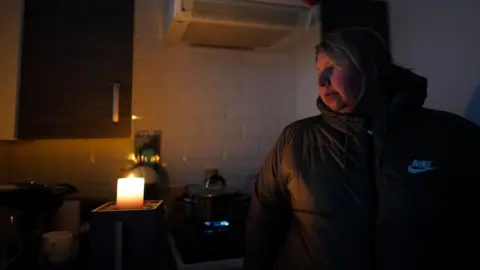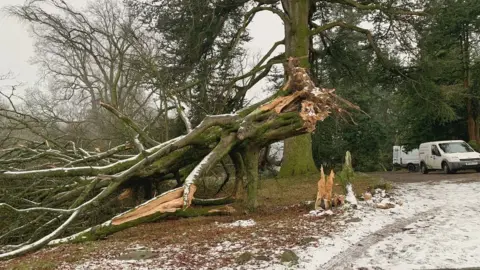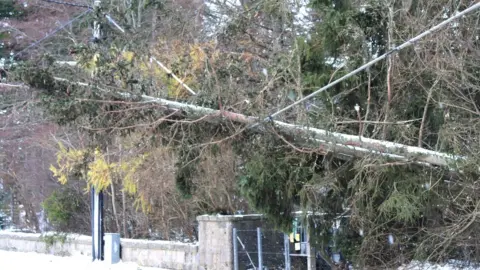Storm Arwen: Get ready for more storm power cuts, energy firms told
 Getty Images
Getty ImagesPower firms must improve their storm response after Storm Arwen left more than one million UK homes without power last year, a report by the energy regulator says.
The storm brought severe wind, rain and snow across England, Scotland, Wales and Northern Ireland on 26 November.
Three people died as gusts of up to 100mph lashed the UK.
Ofgem boss Jonathan Brearley told power firms to "up your game" and "get ready for winter".
Speaking to BBC Radio 4's Today programme, he said companies were "not well prepared" for the storm.
In future, they should maintain and invest more in the network, provide clearer communication to customers about when they will be reconnected, and be more imaginative about how they get people back on supply, he said.
"This is a really tough time for customers right now, this is a market where everyone is having a difficult time.
"Every energy company that is working in this country needs to be working on behalf of their customers and that means big changes for the networks."
The storm - which saw nearly 4,000 people in north-east England and Scotland cut off from their energy supply for more than a week - caused widespread damage, with high winds snapping or uprooting trees that fell onto overhead lines.
The north east of Scotland, Dumfries and Galloway and the Scottish Borders were among the worst-hit areas.
Ofgem said three network companies - Northern Powergrid, Scottish and Southern Electricity Networks and Electricity North West - have agreed to pay £10.3m in "redress payments" to support communities affected by Storm Arwen and for upgrading networks to minimise the impact of severe weather events.
This is in addition to almost £30m in compensation that has been paid by the firms.
 PA Media
PA MediaMr Brearley said the frequency of extreme weather events was only set to increase, so it was really important that industry, and those involved more widely, learned from Storm Arwen to better respond in future.
Ofgem's report found:
- Emergency plans initiated before the storm hit were not adequate to deal with the significant damage that followed
- Some people were cut off for an "unacceptable" length of time, had poor and sometimes inaccurate communications from network firms, and it took too long for them to receive compensation payments
- Around 28% of customers were told they would be back on supply within 24 hours, but that did not happen, and some customers did not think that the support available was made clear to them
- One firm, Northern Powergrid, did not directly contact vulnerable customers enrolled on its Priority Services Register before Storm Arwen, which should have happened under its winter preparedness campaign
- Northern Powergrid also accepted the performance of its call centre "fell below" the expected standards during a severe storm, potentially breaching its licence
- Most power disruption was caused by severe winds and trees toppling onto power lines, with a link found between damaged network poles and their age, although this need further examination
Its key recommendations included:
- Network companies should submit their winter preparedness plans to Ofgem so it can check customers will be supported during power disruptions
- Firms should "stress test" their websites and call centres to ensure they have sufficient capacity for severe weather events
- They should develop "more robust mechanisms" to ensure compensation payments are delivered swiftly and accurately to customers
- Energy firms should voluntarily lift the £700 cap on compensation for future storms as they did for Storm Arwen
- Overhead lines and the management of vegetation should be reviewed to boost network resilience for future storms

'We were told we'd get power back within 24 hours - it took a week'
 National Trust
National TrustJamie Sunderland, who lives in Brigsteer, a village in South Cumbria, had no power for a week after Storm Arwen.
With a toddler who could not be at home with no heating or lighting, he was forced to camp out with family and friends.
They were initially told they would be reconnected in about 12 to 24 hours, but after three days, they took such assurances "with a pinch of salt".
Reacting to Ofgem's report, he said its finding that customers received "unacceptable" service was correct.
"The problem was lack of information. If we'd been told more accurately that the power was going to be off for three or four days then we'd have been able to plan more accurately.
"For instance, we didn't think to empty the fridge or the freezer, thinking it was only for a short time.
"And all that food went to waste. If we'd realised it would have been longer we'd have taken more frozen stuff with us."
'I was left out of pocket after using generators to power my farm'
Simon Bainbridge, a farmer in Northumberland, was left without power for eight days and says having to use seven generators to keep the farm running left him out of pocket, even with the compensation he received.
He argues there needs to be more investment and active checks of the network to protect power supplies for future events.

The Energy Networks Association, which represents the UK and Ireland's power firms, said six electricity firms planned to boost investment in network resilience measures from about £12bn to £14.5bn over the next five years.
The extra cash would fund tree cutting, flood prevention and other measures to protect the UK's power network against future severe weather events, it added.
The firms have submitted these details in their business plans for the next five years, subject to Ofgem's approval.
Phil Jones, chief executive of Northern Powergrid, said it had improved its handling of customer communications and estimated power restoration times, and had invested further in its website, telephone systems and power cut maps to cope with periods of high demand.
Mr Jones said that by the end of the 2015- 2023 period, Northern Powergrid would have invested almost £1bn in maintaining its network.
Business and Energy Secretary Kwasi Kwarteng said it was clear thousands of customers had been badly let down by electricity network companies and that a new action plan would improve preparedness for future storms.
 SSEN
SSENAdditional reporting by Catherine Lee.
